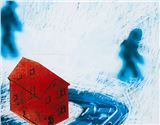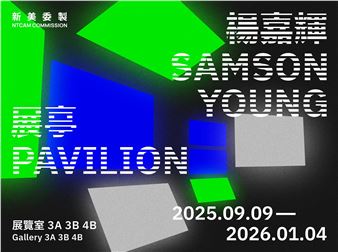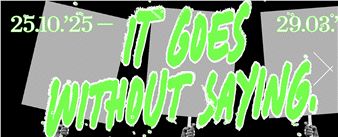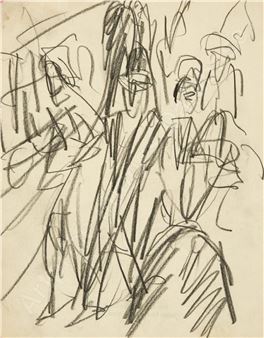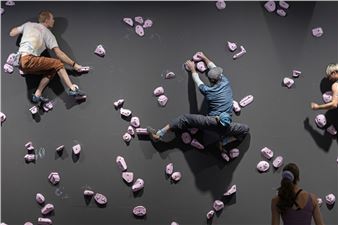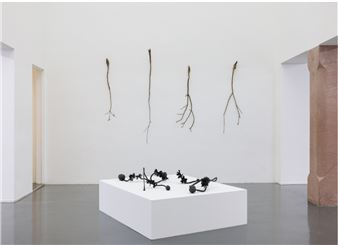Johan Grimonprez: All Memory Is Theft
With В»All Memory Is TheftВ«, the ZKM presents a major retrospective of Belgian media artist Johan Grimonprez (*1962), whose work dances on the boundaries of theory and practice, art and cinema, beyond the dualisms of documentary and fiction, other and self, mind and brain, emphasizing a multiplicity of realities.
вҖңWho owns our imagination in a world of existential vertigo where truth has become a shipwrecked refugee?вҖқ is one of Johan GrimonprezвҖҷ underlaying inquiries: вҖңIs it not the storyteller who can contain contradictions, and slip between the languages that entangle our worlds, to become a time-traveler of the imagination?вҖқ
Informed by an archaeology of present-day media, GrimonprezвҖҷ work depicts intimate stories that brush up against the bigger picture of a global technocracy, calling into question our collective imagination deeply haunted by the omnipresence of Big Tech. No longer happy customers, as digital flaneurs we have become avid consumers of a fear-industry. Paranoia, the new normal, makes it easier to ponder the end of the world than to imagine political alternatives to transform society in view of todayвҖҷs challenges.
вҖңThere is a mourning for a lost future,вҖқ writes the author and activist Max Haiven in his book В»Crisis of Imagination. Crisis of PowerВ« (2014), вҖңnot for what was but for what could be.вҖқ In GrimonprezвҖҷ works, history and memory not merely function as a means to recall the past, but rather as a tool to negotiate the present in order to reshape a shared future. Memory, after all, is a form of collective storytelling; the contested site of ideological struggle, where we redeem our forgotten dreams. As writer James Baldwin once remarked, вҖңhistory is not the past, it is the present. We carry our history with us, we are our history.вҖқ In Lewis CarrollвҖҷs В»Alice in WonderlandВ« (1865) the Queen confronts Alice with a similar idea: вҖңitвҖҷs a poor sort of memory that only works backwards.вҖқ
В»All Memory Is TheftВ« at ZKM presents works by Johan Grimonprez from the past 35 years through a multi-layered and intertextual journey. The exhibition includes interactive installations, feature films and never before shown shorts, story boards, quirky archival sources, textual quips, photographs, and a recent series of drawings. Conceived as an expanding vlog, the visitors are invited to discover a museum-sized artistic scrapbook with a multiplicity of stories, attempting not to reproduce, but to rupture, question, and arrest our insatiable media consumption. As a child of a bygone TV-era, Grimonprez, takes us on a roller coaster through a destabilizing universe, where history and imagination, dreams and the tangible, are intertwined with CNN and Hollywood, home movies and ChatGPT as access codes to reality.
The exhibition reaches from earlier works such as В»Kobarweng or Where is your HelicopterВ« (1992), which reclaims the memory of a colonial past framed by a global vulture economy, to GrimonprezвҖҷ 1997 documenta X contribution В»dial H-I-S-T-O-R-YВ«, his investigation into doppelgГӨngers in В»Looking for AlfredВ« (2005) and В»Double TakeВ« (2009), his examination of the relationship between war, media, and the international arms trade in В»every day words disappearВ« (2016) and В»Blue OrchidsВ« (2017), to his latest film В»Soundtrack to a Coup dвҖҳГүtatВ« (2024). Co-produced by the ZKM and OscarВ® nominated for best documentary, it tells the story of Congolese independence from Belgian colonial rule in 1960 and the subsequent assassination of the first democratically elected premier Patrice Lumumba, tracing the connection between jazz, geopolitics, and colonial power dynamics during the Cold War.
Underneath a falling house in the center of the ZKM atrium, a newly conceived in-situ installation В»Maybe the sky is really green, and weвҖҷre just colorblindВ« (2011вҖ“today) revisits the history of channel surfing in relation to the TV-dinner and the commercial break. Reworked as a vlog, it reveals how science fiction and the concept of zapping stages close encounters with imaginary and not-so imaginary Others in the wake of an exponential rise of Artificial Intelligence.
Paraphrasing French philosopher and media theorist Paul Virilio, Grimonprez once detailed that every technology provokes its own accident: вҖңWhen you invent the ship, you invent the shipwreck; when you invent the plane you also invent the plane crash.вҖқ One could add, with the advent of Artificial Intelligence, reality, and with it our consciousness, has been accidented itself. Today, media no longer need to catch up with reality, it is rather reality that has to catch up with media.
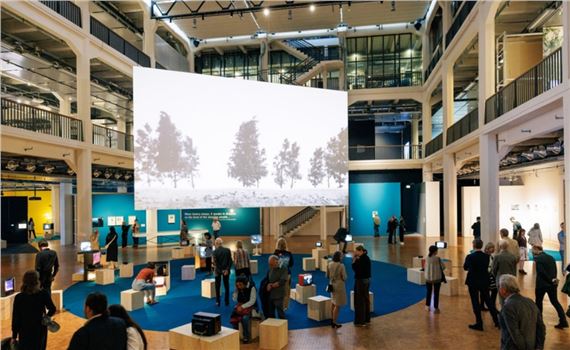
Recommended for you
With В»All Memory Is TheftВ«, the ZKM presents a major retrospective of Belgian media artist Johan Grimonprez (*1962), whose work dances on the boundaries of theory and practice, art and cinema, beyond the dualisms of documentary and fiction, other and self, mind and brain, emphasizing a multiplicity of realities.
вҖңWho owns our imagination in a world of existential vertigo where truth has become a shipwrecked refugee?вҖқ is one of Johan GrimonprezвҖҷ underlaying inquiries: вҖңIs it not the storyteller who can contain contradictions, and slip between the languages that entangle our worlds, to become a time-traveler of the imagination?вҖқ
Informed by an archaeology of present-day media, GrimonprezвҖҷ work depicts intimate stories that brush up against the bigger picture of a global technocracy, calling into question our collective imagination deeply haunted by the omnipresence of Big Tech. No longer happy customers, as digital flaneurs we have become avid consumers of a fear-industry. Paranoia, the new normal, makes it easier to ponder the end of the world than to imagine political alternatives to transform society in view of todayвҖҷs challenges.
вҖңThere is a mourning for a lost future,вҖқ writes the author and activist Max Haiven in his book В»Crisis of Imagination. Crisis of PowerВ« (2014), вҖңnot for what was but for what could be.вҖқ In GrimonprezвҖҷ works, history and memory not merely function as a means to recall the past, but rather as a tool to negotiate the present in order to reshape a shared future. Memory, after all, is a form of collective storytelling; the contested site of ideological struggle, where we redeem our forgotten dreams. As writer James Baldwin once remarked, вҖңhistory is not the past, it is the present. We carry our history with us, we are our history.вҖқ In Lewis CarrollвҖҷs В»Alice in WonderlandВ« (1865) the Queen confronts Alice with a similar idea: вҖңitвҖҷs a poor sort of memory that only works backwards.вҖқ
В»All Memory Is TheftВ« at ZKM presents works by Johan Grimonprez from the past 35 years through a multi-layered and intertextual journey. The exhibition includes interactive installations, feature films and never before shown shorts, story boards, quirky archival sources, textual quips, photographs, and a recent series of drawings. Conceived as an expanding vlog, the visitors are invited to discover a museum-sized artistic scrapbook with a multiplicity of stories, attempting not to reproduce, but to rupture, question, and arrest our insatiable media consumption. As a child of a bygone TV-era, Grimonprez, takes us on a roller coaster through a destabilizing universe, where history and imagination, dreams and the tangible, are intertwined with CNN and Hollywood, home movies and ChatGPT as access codes to reality.
The exhibition reaches from earlier works such as В»Kobarweng or Where is your HelicopterВ« (1992), which reclaims the memory of a colonial past framed by a global vulture economy, to GrimonprezвҖҷ 1997 documenta X contribution В»dial H-I-S-T-O-R-YВ«, his investigation into doppelgГӨngers in В»Looking for AlfredВ« (2005) and В»Double TakeВ« (2009), his examination of the relationship between war, media, and the international arms trade in В»every day words disappearВ« (2016) and В»Blue OrchidsВ« (2017), to his latest film В»Soundtrack to a Coup dвҖҳГүtatВ« (2024). Co-produced by the ZKM and OscarВ® nominated for best documentary, it tells the story of Congolese independence from Belgian colonial rule in 1960 and the subsequent assassination of the first democratically elected premier Patrice Lumumba, tracing the connection between jazz, geopolitics, and colonial power dynamics during the Cold War.
Underneath a falling house in the center of the ZKM atrium, a newly conceived in-situ installation В»Maybe the sky is really green, and weвҖҷre just colorblindВ« (2011вҖ“today) revisits the history of channel surfing in relation to the TV-dinner and the commercial break. Reworked as a vlog, it reveals how science fiction and the concept of zapping stages close encounters with imaginary and not-so imaginary Others in the wake of an exponential rise of Artificial Intelligence.
Paraphrasing French philosopher and media theorist Paul Virilio, Grimonprez once detailed that every technology provokes its own accident: вҖңWhen you invent the ship, you invent the shipwreck; when you invent the plane you also invent the plane crash.вҖқ One could add, with the advent of Artificial Intelligence, reality, and with it our consciousness, has been accidented itself. Today, media no longer need to catch up with reality, it is rather reality that has to catch up with media.
Artists on show
Contact details


 ARTISTS
ARTISTS




